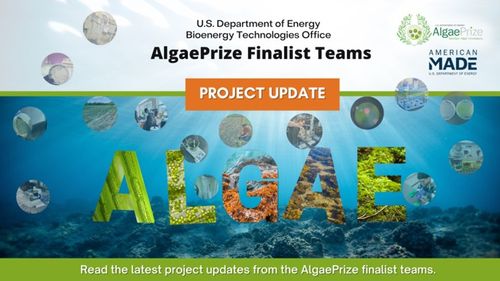DOE: AlgaePrize finalist teams make great strides in projects to unlock algal energy

SOURCE: U.S. Department of Energy
July 16, 2024
BY U.S. Department of Energy
Since being selected as finalists for AlgaePrize 2023–2025, student teams from across the country have been rolling up their sleeves to turn smart research proposals into results. Now only approximately five months into the competition, the U.S. Department of Energy Bioenergy Technologies Office is thrilled to celebrate the progress they have already made.
As reflected in the updates below, the teams are making great strides in 15 unique projects that aim to unlock algal energy from a variety of angles—from improving commercial seaweed cultivation to making nanomaterials from macroalgae, predicting prime locations for future algae farms with machine learning, and beyond.
- AlgaeNano+ (University of Puerto Rico – Rio Piedras Campus, San Juan, Puerto Rico): designed and implemented an eco-friendly protocol for producing carbon nanomaterials from algae and designed a low-temperature, reduced-energy protocol using Sargassum.
- AlgaeUnlocked (Southern Illinois University Carbondale, IL): optimized the use of oxidative hydrothermal dissolution to process Chlorella biomass.
- Algators (Livingston High School, Livingston, NJ): cultivated both Chlorella and Hematococcus for terrestrial crop fertilizer optimization trials.
- Aloha Limu (University of Hawaii at Hilo, HI): rehabilitated an existing aquaculture facility by constructing novel, vertical, space-saving seaweed photobioreactors.
- BlazerBloom (Hood College, Frederick, MD): developed a high-risk, high-reward strategy by using naturally magnetic bacteria to flocculate and magnetically harvest microalgae for biofuel production.
- Blue Genes (Solano Community College, Fairfield, CA): cultivated Spirulina, extracted phycocyanin using a variety of strategies, and engaged in outreach events.
- Clean Green Feed (University of Connecticut, Storrs, CT): rejected autotrophic and heterotrophic cultivation in favor of mixotrophic protocols and established optimum parameters.
- Green Skies (The Blake School, Minneapolis, MN): established a relationship with Pacific Northwest National Laboratory and acquired access to the Biomass Assessment Tool and TanDemX.
- Green Thumbs (Colorado School of Mines, Golden, CO): developed marine electroflocculation using pH control without electrode degradation.
- JCCC Chlorella Cavaliers (Johnson County Community College, Overland Park, KS): optimized the growth of Chlorella cultures and developed transgenic protocols, including novel primers for the transformed alga containing plastic-degrading enzymes.
- Just AD Algae (Sante Fe Community College, Sante Fe, NM): focused on the cultivation of Chlorellavulgaris to yield biomass for metabolizing cooking oil and producing biogas.
- KelBerry (University of Connecticut, Storrs, CT): developed and adopted sugar kelp processing protocols.
- Parachlorella Plastic Pals (University of California San Diego, La Jolla, CA): focused on optimizing Parachlorella cultivation and extracting free fatty acids, including C18:2 and C18:3.
- Team ASAP (Camas High School, Camas, WA; Belmont High School, Los Angeles, CA; Irvine High School, Irvine, CA): developed protocols to maintain the gametophytic stage of kelp life histories (Saccharina latissimi, Macrocystis pyrifera, and Nereocystis luetkeana) for just-in-time production of sporophytes, as well as identified and customized CRISPR protocols.
- The Algenius Thinkers (The University of Texas at Austin, Austin, TX): cultivated the model organism, Phaeodactylum tricornutum, which is the focus of genetic modification efforts, and identified a plasmid for initial experimental procedures.
BETO wishes everyone luck as they edge closer to the AlgaePrize Competition Weekend in April 2025, when teams will present their results and judges will select the grand champion. Until then, stay tuned for future updates on the teams’ projects, and visit the AlgaePrize Competition webpage to learn more.
Advertisement
Advertisement
Advertisement
Advertisement
Related Stories
Bangkok Airways Public Company Limited has officially announced the adoption of sustainable aviation fuel (SAF) on its commercial flights, reinforcing Thailand’s green aviation industry. The initiative took effect starting July 1, 2025.
Avalon Energy Group LLC and Sulzer Chemtech have signed a strategic alliance and partnership agreement to scale up the production of SAF. Under the agreement, Avalon has selected BioFlux technology for its portfolio of SAF projects.
The USDA has announced it will delay opening the first quarterly grant application window for FY 2026 REAP funding. The agency cited both an application backlog and the need to disincentivize solar projects as reasons for the delay.
Neste and DHL Express have strengthened their collaboration with the supply of 7,400 tons (9.5 million liters) of neat, i.e. unblended, Neste MY Sustainable Aviation Fuel to DHL Express at Singapore Changi Airport starting July 2025.
CoBank’s latest quarterly research report, released July 10, highlights current uncertainty around the implementation of three biofuel policies, RFS RVOs, small refinery exemptions (SREs) and the 45Z clean fuels production tax credit.
Upcoming Events










